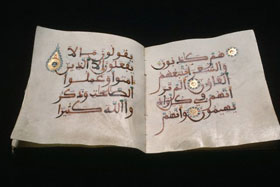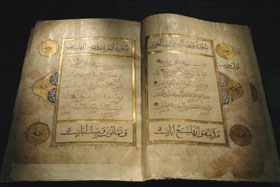 Many people misunderstand the Quran’s literary challenge to produce something like it. Many people assume it simply means writing something as “good” as the Quran. Many people misunderstand the Quran’s literary challenge to produce something like it. Many people assume it simply means writing something as “good” as the Quran.Because of this, many skeptics point out – and rightly so – that literary value judgments are highly subjective. If someone says that he thinks a certain selection of prose or poetry is better than the Quran, who can argue with him? Isn’t it really a matter of personal judgment and taste? Who is to be the arbiter? The Quran’s challenge, however, is not simply to write something of equal literary merit, but rather to produce something like the Quran. We can see this in all the verses of challenge. God says: “Say (O Muhammad) if mankind and jinn were to come together to produce something like this Quran, they would not be able to do so, even if they were to help one another.” (Quran 17:88) God says: “Or they say: ‘He has forged it.’ Say: ‘Then bring ten forged chapters like it and If then they do not answer you, know that it is sent down with the Knowledge of God, besides Whom there is no other God. Will you then be Muslims?” (Quran 11:13) God says: “Or do they say ‘He has forged it.’ Say: ‘Then bring a chapter like it and call whoever you can besides God if you are truthful’.” (Quran 10:38) God says: |
Abdullah Bin Imrân Camii, Mekke, Suûdî Arabistan
-
*Abdullah Bin Imrân Camii, Mekke, Suûdî Arabistan*
*Caminin Mihrab ve Minberi*
*Abdullah Bin Imrân Camii, Mekke, Suûdî Arabistan*
*Caminin Minaresi*
*C...
10 hours ago
 The Quran is not only unique in the way in which it presents its subject matter, but it is also unique in that it is a miracle itself. By the term “miracle,” we mean the performance of a supernatural or extraordinary event which cannot be duplicated by humans. It has been documented that Prophet Muhammad, may the mercy and blessings of God be upon him, challenged the Arabs to produce a literary work of a similar caliber as the Quran, but they were unable to do so in spite of their well-known eloquence and literary powers. The challenge to reproduce the Quran was presented to the Arabs and mankind in three stages:
The Quran is not only unique in the way in which it presents its subject matter, but it is also unique in that it is a miracle itself. By the term “miracle,” we mean the performance of a supernatural or extraordinary event which cannot be duplicated by humans. It has been documented that Prophet Muhammad, may the mercy and blessings of God be upon him, challenged the Arabs to produce a literary work of a similar caliber as the Quran, but they were unable to do so in spite of their well-known eloquence and literary powers. The challenge to reproduce the Quran was presented to the Arabs and mankind in three stages: Some claim that the Quran was the work of the devil.
Some claim that the Quran was the work of the devil. The Glorious Quran, the Muslims’ religious Scripture, was revealed in Arabic to the Prophet Muhammad, may the mercy and blessings of God be upon him, through the angel Gabriel. The revelation occurred piecemeal, over a period of twenty-three years, sometimes in brief verses and sometimes in longer chapters.
The Glorious Quran, the Muslims’ religious Scripture, was revealed in Arabic to the Prophet Muhammad, may the mercy and blessings of God be upon him, through the angel Gabriel. The revelation occurred piecemeal, over a period of twenty-three years, sometimes in brief verses and sometimes in longer chapters.
